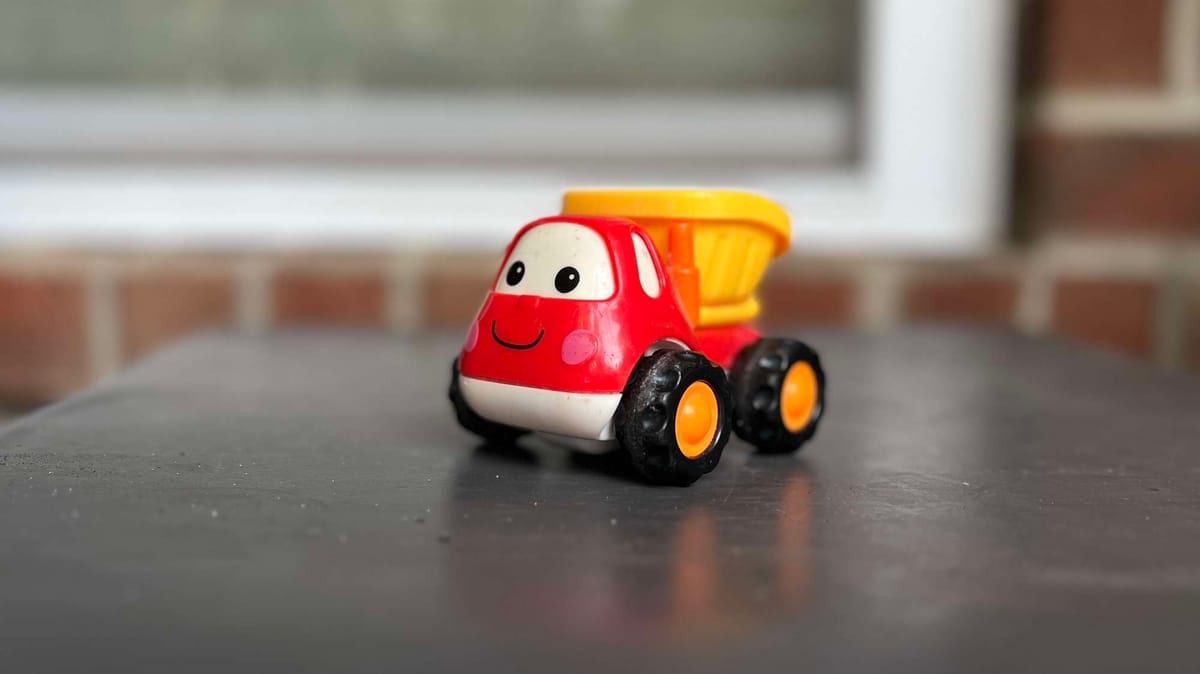Writing with Toddlers
It’s absolutely possible to make time for it.

"Appealing workplaces are to be avoided."
—Annie Dillard, The Writing Life
In these fraught times of writing with three kids ages three and under, I find myself crafting sentences in conditions my past self would’ve dreamed unfathomable and utterly disagreeable.
Like right now, I’m dictating the start of this piece into my phone before hopping into the shower right before dinner. Or yesterday, when I sat on the deck of my apartment while my kids scooped up handfuls of dirt from the potted plant to place in a toy dump truck and scatter across the wooden planks and also partially on my keyboard.
These days, my kitchen table is my most commonly used desk. Sometimes I sit on a chair on the deck because it's the closest thing I have to a dedicated workspace. I outline pieces while I'm in the shower or driving to work. Sometimes the first draft takes shape entirely on a 15–20 minute drive while running errands. At other moments, the fragment of a sentence or an idea hits me after hours of churning over a topic and I have to whip out my phone right before bed to jot the idea down in Obsidian.
Beautiful sentences are never remembered the next day, no matter how much you think their beauty will enable you to retain them. Great ideas at bedtime evaporate with the morning's dew.
My past self believed that you need a quiet, dedicated space to write—at least the majority of the time. I considered coffee shops to be an acceptable alternative because uninitiated writers believe that Americanos sold at a 200% markup help you write better.
I rarely have a consistent time or place to write, but in the past three years, I've written and published 45 pieces on this site, which works out to about one post a month since I started having kids. Some months I've published more, some months I've published fewer. I aim for one post every two weeks, but the demands and realities of adulthood are the main drivers of publishing cadence.
Right in the middle of writing this piece, my oldest son came out on the deck with a ball and said, "I want to throw baw wih yoouh." And then he threw a big blue rubber ball right at my head. We started a very short-lived game of catch because that's how toddlers do. He decided he wanted water and promptly went back inside.
Not only have I written more in terms of quantity and consistency after having kids—I've also written in more places than I thought were conducive for writing. When my daughter was born, she refused to take a nap anywhere except the baby carrier. My wife was recovering from a brutal emergency C-section, so I strapped my daughter into the Baby Bjorn where she slept soundly on my chest for hours.
The story about the C-section is a much longer one, but it involved a five-day hospital stay because of an infection in both mom and baby. C-sections are a major surgery to begin with, and emergency ones are more traumatic because they are performed when the life of mom or baby or both is in danger. It took some time before my wife was healed up enough to baby carry comfortably.
I was working as a contract writer for SCAD and there were deadlines to meet, so I dictated entire units of content for online courses during that time. It was hard to get used to dictation because college and my work as a technical writer had trained me to think and write while sitting down and typing, so it required rewiring my brain to write differently.
During the past three years, I've discovered that I have to adapt my process to fit into my life—not the other way around. By placing less emphasis on curating the right space, place, and time to write, I'm actually primed to write more often. I try to strike the iron when it's hot. I leverage naps and the sweet quiet time after the kids' bedtime. I force myself to get comfortable with dictation because it's the only option. It's less about making margin to write and more about redeeming the margins that already exist.
If something's important to you and gives you life, you'll find a way to make it work.



